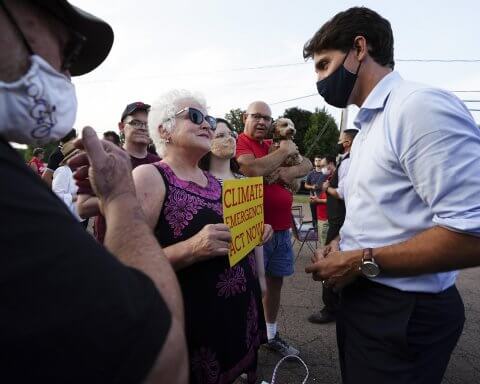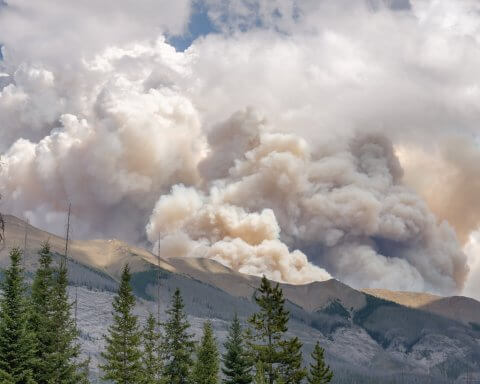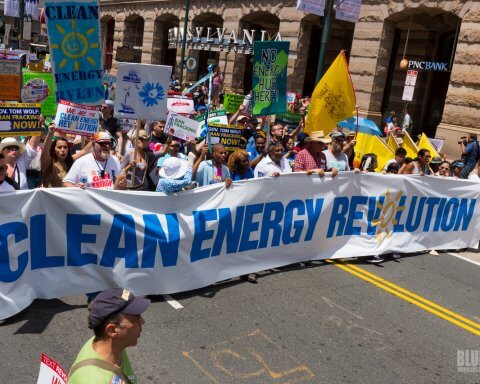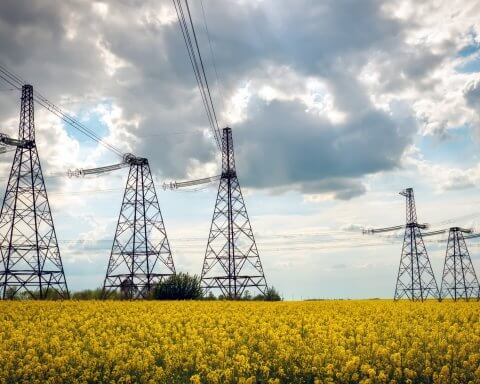We are living through a pivotal moment in time, confronting the urgency of converging environmental, social and economic crises. Young people today are being disproportionately affected by the long-lasting impacts of the pandemic, all the while inheriting a planet on fire.
The upcoming decade is crucial for avoiding the worst impacts of the climate crisis. This federal election is a critical opportunity to demand that our political leaders listen and act at the scale and speed we know is necessary to address the climate emergency. The latest report from the Intergovernmental Panel on Climate Change (IPCC) underscores, yet again, the urgency to act.
Despite their reputation for being less likely to vote, young people are not apathetic – millennials are the country’s largest voting bloc. They represent more than 40% of voters in this election – and they have a lot riding on the election outcomes.
The youth of today know that they will face the burden of tomorrow, and they are seeking to meaningfully participate in decision-making processes that will affect our future. The choices made by policy-makers, governments and leaders today will shape our societies for years to come. It’s vital that young people are given the opportunity and power to co-create the solutions for the future.
This is the impetus behind the Davos Lab, an initiative of the Global Shapers Community that mobilized more than two million people in 180 nations to develop a youth-driven recovery plan to address the world’s socio-economic and environmental crises. A group of 14,000 young people around the world compiled the ideas behind the plan, released in August. They mobilized interested stakeholders to outline a vision of collective action that will help policy-makers integrate the voices of the next generation into recovery efforts. Such dialogues, led by young people, were also held across Canada, focusing on various topics, including conscious consumerism and accelerating a net-zero transition.
One of the main issues of concern for youth in Canada and around the globe is the need for a green recovery and meaningful jobs. Job insecurity is on the rise, and young people are unclear about career prospects in this time of uncertainty. The RBC Future Launch study of more than 1,800 Canadians aged 14 to 29, released in March, found that in every province, youth are significantly less confident when it comes to their job prospects and how prepared they are for the future of work. Gen-Z women make up 2.5% of the Canadian labour force but account for 17% of the total decline in employment during the pandemic.
Young people risk being left behind as they are struggling with the youth unemployment crisis. That’s why we’re now calling on all federal political parties to commit to substantial investments in youth-led climate solutions, and skills development. This can also include the creation of a youth climate corps that provides good-paying green public jobs and puts Canadian youth to work. Young people can work toward restoring ecosystems, building community resilience, protecting biodiversity and contributing to care work. Ensuring equitable access to these opportunities will be critical to elevating youth voices in addressing climate change.
In their 2021 election platform, the Liberals have broadly pledged to invest $8 billion to “accelerate green jobs,” in addition to investments in “youth employment and skills srategy.” The NDP promises to establish a civilian climate corps of young people to create jobs supporting conservation and “build an equitable clean-energy economy.”
The Green Party platform also references the “creation of a youth climate corps” as part of its green jobs training program, while the Conservative platform does not include a direct mention of green jobs. (Shake Up the Establishment, a youth-led non-profit organization, provides a detailed summary of each party’s climate and environmental promises.)
We need all federal political parties to embrace a comprehensive strategy that creates pathways for good green jobs for young people, especially those from equity-seeking groups. We also call on all parties to commit to shaping policy in collaboration with youth and invest in youth-led climate solutions, as well as holding companies accountable for environmental harms that jeopardize our future.
The actions being taken to date are not enough: Canada’s climate record is the worst among the G7, as emissions have continued to increase. A society-wide mobilization to address the climate crisis requires transforming our economy – it means reducing emissions rapidly, scaling regenerative business models that do not rely on the exploitation of people and the planet, mobilizing capital toward equitable climate solutions, and ending fossil fuel subsidies. As noted in Canada’s first state of the youth report, released in August 2021, “the climate crisis can only be solved with an overhaul of the system, not individual actions.”
If we are to avoid these pitfalls, we must ensure that we lay a foundation that addresses the systemic issues in our society by investing in young people, as they are the best placed to lead the transition to a more sustainable world. We are quickly becoming the last generation with the ability to slow down the rate of climate change. If today’s politicians want our vote, they must commit to saving our future.
Puninda Thind is a sustainability professional, climate justice organizer and a Global Shaper passionate about building resilient, sustainable and just communities. Laura Corrales is an ESG consultant, social intrapreneur, Global Shaper and Action Canada Fellow passionate about youth leadership and systemic change. Robyn Seetal is a CPA, CA, sustainability consultant, and impact investor passionate about adopting eco-centric leadership as a tool for systemic change. Anoosha Lalani is a CPA and passionate environmentalist interested in the financial impact of ESG issues.







